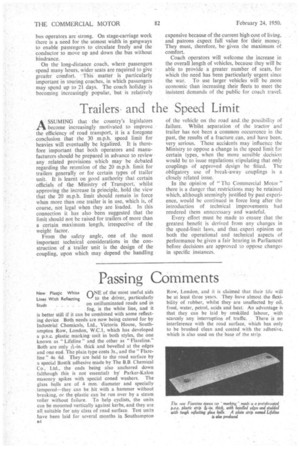Trailers and the Speed Limit
Page 38

If you've noticed an error in this article please click here to report it so we can fix it.
ASSUMING that the country's legislators become increasingly motivated to improve the efficiency of road transport, it is a foregone conclusion that the 30 m.p.h. speed limit for heavies will eventually be legalized. It is therefore important that both operators and manufacturers should be prepared in advance to review any related provisions which may be debated regarding the retention of the 20 m.p.h. limit for trailers generally or for certain types of trailer unit. It is learnt on good authority that certain officials of the Ministry of Transport, whilst approving the increase in principle, hold the view that the 20 m.p.h. limit should remain in force when more than one trailer is in use, which is, of course, not legal when they are loaded. In this connection it has also been suggested that the limit should not be raised for trailers of more than a certain maximum length, irrespective of the weight factor. From the safety angle, one of the most important technical considerations in the construction of a trailer unit is the design of the coupling, upon which may depend the handling of the vehicle on the road and the possibility of .failure. Whilst separation of the tractor and trailer has not been a common occurrence in the past, the results of a fracture can, and have been, very serious. These accidents may influence the Ministry to oppose a change in the speed limit for certain types, when the more sensible decision would be to issue regulations stipulating that only couplings of approved design be fitted. The obligatory use of break-away couplings is a closely related issue.
In the opinion of "The Commercial Motor" there is a danger that restrictions may be retained which, although seemingly justified by past experience, would be continued in force long after the introduction of technical improvements had rendered them unnecessary and wasteful.
Every effort must be made to ensure that the greatest benefit is derived from any changes in the speed-limit laws, and that expert opinion on both the operational and technical aspects of performance be given a fair hearing in Parliament before decisions are approved to oppose changes in specific instances.




































































































